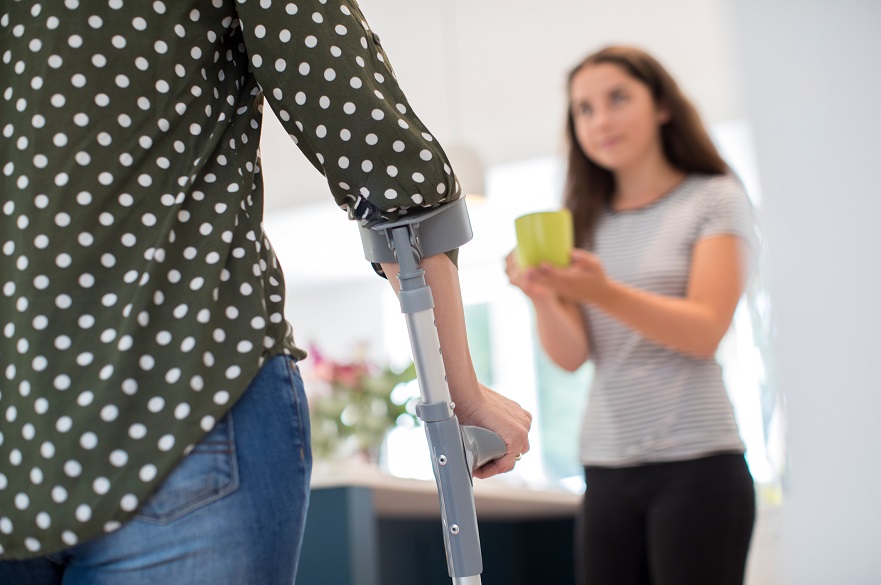Carers Rights Day: raising awareness and supporting carers
As the UK marks Carers Rights Day on 25 November, researcher and senior lecturer in Human Resource Management at Nottingham Business School, Dr Louise Oldridge, highlights the struggles people face when looking after their friends and family.
By Helen Breese | Published on 23 November 2021
Categories: Research; Nottingham Business School;

It has been well documented that the UK has an ageing population, and that people are not only living longer but doing so with health problems and increasing rates of disability. Alongside this, the government has offered less support to adult social care services, and the COVID-19 pandemic has further underlined the systemic issues in social care, including underfunding, staff shortages, and fragmented provision. As I highlighted earlier in the year, and as reported, mandatory vaccination for social care workers will only increase staff shortfalls.
This has led to an increasing, but unrecognised, reliance on care being provided informally by family and friends. A carer is anyone who cares, unpaid/informally, for a friend or family member who due to illness, disability, a mental health problem or addiction cannot cope without their support. The pandemic has led to an increase in both the number of carers in the UK and the amount of care being provided, often because of service closures. Over 6.5 million people are carers, and Carers UK estimate that 1 in 4 adults were providing unpaid care for adults at the peak of the pandemic. This has been estimated to be worth £530 million per day, or £193 billion a full year.
At the time of the last census, the highest amount of care was provided by women aged 50 – 64. However, frequently, individuals do not recognise themselves as carers because of existing relationships around family or friendship that carers more often identify with; for example, a daughter caring for her mother. Lack of identification and visibility of unpaid care was intensified during the pandemic, whereby carers reported feeling overwhelmed and forgotten.
In the UK, Carers Rights Day on 25 November 2021 aims to:
- Make carers aware of their rights
- Let carers know where to get help and support
- Raise awareness of the needs of carers
Reviewing the global growth of unpaid care and need for sustainable care policies, Professor Mary Larkin and I highlighted that whilst caring can be rewarding it can also be challenging and can lead to loneliness, health problems, and financial worries. Many carers are also juggling work and care. Even before COVID-19, 600 carers were leaving their jobs every day. In my PhD I explored the intersections of mid-life women’s caring and careers, and my participants reported that caring had impacted working hours, roles and responsibilities. For some this meant taking career breaks, feeling that their careers had plateaued and/or leaving employment. Yet they also described how interesting and fulfilling their work was, and participants reported feeling like they added value to both organisations and society by continuing to work. As such, in a 2019 publication I called for both employer and policy level support for working carers.
Teaching in higher education I am also aware of the impact that caring can have on study. Young adult carers are defined as those aged 16-25 who provide unpaid care for an adult family member or friend. At the time of the last census in 2011 there were more than 375,000 young adult carers in the UK and for these individuals transitioning to university, and beyond, can be challenging, and for some, a barrier to accessing higher education. Research found that although young adult carers can gain a range of skills through caring and it may inform their subject(s) of study, it can affect their health and social life, with 45% reporting it had affected their mental health. Juggling caring and education can also cause stress, with 29% having dropped out of college/university due to their caring responsibilities. This figure is four times greater than the national average. We do not know the exact number of carers at university, particularly as the current UCAS form does not ask students about caring responsibilities, but their website does suggest referring to caring in personal statements, highlighting skills development.
I am currently working on a project seeking to understand the experiences of young adults (aged 18 – 25) who are caring for dependent adults whilst studying (at Nottingham Trent University or other UK institutions), with a view to understanding how caring has impacted higher education and career choices and seeking to understand the best modes of support across the student life cycle.
If you are aged 18-25, are currently (or have previously been) caring for (or looking after/helping) an adult family member or friend and are currently studying at a UK university you might be interested in taking part in a research interview. Doing so would provide an opportunity to have your voice heard, add to understanding of the key experiences and issues affecting student carers, and inform support requirements.
Please get in touch (email: louise.oldridge@ntu.ac.uk) to find out more.
The reality is that at some point in our lives we will be both carers and be cared for. As Vanessa (a participant in my PhD study) said: “… I hope it doesn’t happen to you, but it is going to happen to you.”
Dr Louise Oldridge, senior lecturer in Human Resource Management, Nottingham Business School